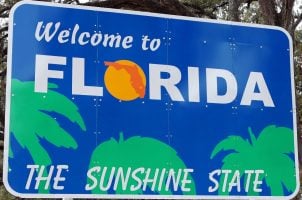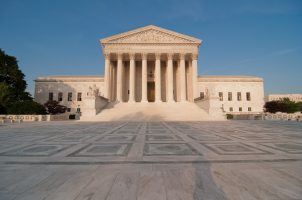Florida Sports Betting Update: Appeals Court to Hear Arguments
Posted on: November 14, 2022, 11:47h.
Last updated on: November 16, 2022, 03:44h.
The legal issues surrounding a controversial Florida gaming compact that would have brought sports betting to the Sunshine State is again on the docket.

The Seminole Tribe of Florida and the US Department of the Interior filed replies Monday in the US Circuit Court of Appeals for the District of Columbia. They are arguing that US District Judge Dabney Friedrich erred nearly a year ago when she struck down the tribe’s gaming compact with the state of Florida.
That ruling on behalf of the Magic City Casino and the Bonita Springs Poker Room eventually forced the Seminole Tribe to shut down its Hard Rock Sportsbook mobile app, which had been operating for about a month in the Sunshine State.
Friedrich accepted the plaintiffs’ argument that the gaming compact, which allowed the tribe to operate as the exclusive statewide mobile sports betting operator in Florida, violated the Indian Gaming Regulatory Act (IGRA) because it included gaming off tribal lands.
Understanding the Law
IGRA is the 34-year-old federal law that covers tribal gaming across the country. It requires the Interior Department to review gaming compacts and decide whether they’re approved or rejected.
The Interior Department claims the compact is in line with IGRA. The law does not mandate that Interior Secretary Deb Haaland check state law to ensure the tribe and state are adhering to state law before signing off on the agreement.
While the Indian Gaming Regulatory Act does not provide federal authorization for gaming outside Indian lands, it is a separate question whether an IGRA compact between a state and a tribe may acknowledge, rather than authorize, a state’s decision to allow such gaming,” the Interior Department stated. “IGRA permits compacts to address such gaming, notwithstanding that its legality ultimately turns on state law, so long as it directly relates to gaming on Indian land.”
Oral arguments in the case are scheduled to be heard on December 14 in the nation’s capital.
How the Case Got Here
In April 2021, the Seminole Tribe and Florida Gov. Ron DeSantis reached an agreement on an amended gaming compact. The most notable item in the 30-year pact was the sports betting provision, including exclusive statewide online rights. It also allowed the Seminole Tribe to offer roulette and dice-based table games at its casinos.
The tribe agreed to make guaranteed payments to the state, including $2.5 billion over the first five years of the arrangement.
As part of the statewide sports betting provision, the tribe agreed to establish a hub-and-spoke network with pari-mutuel operators. Those operators would be allowed to install kiosks at their facilities and take a cut of the proceeds those machines generated.
After the state approved the compact, it went to the Interior Department for a 45-day review. Interior officials didn’t complete their review in that time frame, which meant that the compact is considered approved to the extent it adhered to IGRA.
Magic City and Bonita Springs, sister companies that operate pari-mutuel facilities in Florida, objected to the sports betting provisions in the compact for a couple of reasons. They claimed the online sports betting would take place off of tribal land, which they said violated IGRA. They also argued they would be hurt economically if they didn’t participate in the hub-and-spoke network since they cannot participate in sports betting in any other way.
Last month, the plaintiffs argued in their brief to the appeals panel that IGRA does not cover online gaming.
Seminoles Call Suit a Collateral Attack
In its brief Monday, the Seminole Tribe said the plaintiffs only sued the federal government to stop the tribe from utilizing the rights it received in the amended compact.
“The only reason West Flagler brought suit against Interior is because it could not sue the tribe or state directly,” the tribe argued. “Instead, it sought to collaterally attack their agreement negotiated under IGRA by seeking review of Interior’s deemed approval in their absence. Preventing this collateral attack is where fairness concerns should focus.”
Tribe and Interior Not in Full Agreement
A key point to remember is that while the federal government and the Seminole Tribe are appealing the district court’s decision, they’re not necessarily on the same side here.
Magic City and Bonita Springs filed suit against the Interior Department and Interior Secretary Deb Haaland in US District Court in DC last year, arguing that the federal agency shouldn’t have approved the amended gaming compact.
The Seminole Tribe wasn’t listed as a defendant but tried to join the case to get it dismissed. Friedrich refused the tribe’s motion.
The federal government has raised issues with how the Seminole Tribe is waging its appeal. It claims the tribe’s argument goes against precedent and could negatively impact other cases if granted.
In its brief on Monday, the tribe said both the plaintiffs in the case and the federal government offer an “incredible argument” that the Seminoles are not a required party in the case and that the Interior Department adequately represents the tribe’s interests.
The Seminoles also claim the Interior Department has mishandled the case, claiming the agency “has since continuously failed to make important arguments on the merits.”
For example, the tribe argues the department should have stated its case that “its interpretation of IGRA should receive deference.”
Related News Articles
Florida Sports Betting Compact Opponents Take Case to US Supreme Court
Supreme Court Blocks Florida Sports Betting Plan Pending Appeal
Most Popular
Las Vegas Overstated F1 Race’s Vegas Impact — Report
Vegas Strip Clubs Wrestle in Court Over Animal Names
ESSAY: Remembering ‘The Beatles LOVE’ in My Daughter’s Eyes
Most Commented
-
End of the Line for Las Vegas Monorail
— April 5, 2024 — 90 Comments -
Mega Millions Reportedly Mulling Substantial Ticket Price Increase
— April 16, 2024 — 6 Comments -
Long Island Casino Opponents Love New York Licensing Delays
— March 27, 2024 — 5 Comments -
Nearly Abandoned Mall Outside Vegas Soon to Have Only One Tenant
— March 12, 2024 — 5 Comments















No comments yet